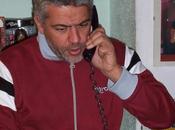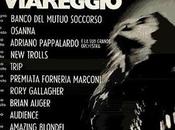
Carlos Kleiber insieme a Herbert von Karajan
“Uniquely, Carlos Kleiber combined the rigors of German analysis, form and discipline with the expressive vitality of Latin dance, pulse and joy. For nearly twenty years at the formative outset, a conductor baptized Karl gradually became Carlos. He never turned his back on that fascinating cultural biochemistry. It would shape everything he did.”
(Charles Barber, amico e biografo di Carlos Kleiber)
Esattamente dieci anni fa, Carlos Kleiber si spegneva nella sua residenza estiva a Litija, piccola città in Slovenia dove, nel cimitero del sobborgo di Konjšica, si trova la sua tomba. Le sue condizioni di salute erano da tempo precarie e ad aggravarle definitivamente fu uno stato di depressione acuta seguito alla scomparsa della moglie, l’ ex ballerina Stanislawa Brezovar, conosciuta negli anni Cinquanta quando il giovane maestro era Kapellmeister alla Deutsche Oper am Rhein di Düsseldorf. Considerato una figura mitica dagli appassionati di tutto il mondo, Kleiber si era di fatto ritirato dopo la tournée in Giappone della Wiener Staatsoper nel 1994, nel corso della quale diresse sei rappresentazioni del nuovo allestimento del Rosenkavalier, prodotto pochi mesi prima. Da allora, era apparso in pubblico solo in una manciata di occasioni insieme alla Bayerische Staatsorchester, fino alla sua ultima, breve tournèe in Spagna del 1997, conclusa da due concerti straordinari a Cagliari che furono le sue ultime esibizioni. Il talento di quello che è stato, senza ombra di dubbio, uno dei direttori d’ orchestra più geniali della storia, aveva ceduto ai problemi nervosi di una personalità divorata dalla sua inesauribile ansia nella ricerca della perfezione. Come tutti sanno, Kleiber era un musicista che non ammetteva compromessi. Dopo aver diretto un repertorio assai vasto nei suoi Lehrjahre da giovane Kapellmeister, aveva gradualmente concentrato la sua attenzione su un ristrettissimo numero di titoli sinfonici e operistici, continuamente analizzati e messi a punto con una cura da orefice. Il suo perfezionismo implacabile lo aveva portato in più occasioni a interrompere le prove e disdire gli appuntamenti, appena si accorgeva che qualcosa non stava andando come lui voleva. Tanto per citare un solo episodio, quando finalmente accettò nel 1994 l’ invito dei Berliner Philharmoniker, che da anni lo avrebbero voluto sul podio ed erano arrivati a offrirgli invano il posto di successore di Karajan, pretese un volo prenotato per ogni giorno delle prove, in modo da potersene tornare immediatamente a casa se le cose non fossero andate per il verso giusto. Molti musicisti che hanno suonato sotto la sua guida hanno descritto Kleiber come una persona adorabile dal punto di vista umano, a volte ingenuo come un bambino, in genere affettuoso con gli orchestrali ma che nelle prove poteva essere capace di accessi di rabbia tali da non temere il confronto con quelli leggendari di Toscanini. Scrupoloso fino alla pignoleria nella messa a punto dei dettagli esecutivi durante le prove, come dimostrano i video realizzati durante la preparazione di alcuni concerti con la Südfunk-Sinfonieorchester di Stuttgart nella primavera del 1970, Carlos Kleiber amava concedersi improvvise invenzioni al momento dell’ esecuzione in pubblico, seguendo il filo dell’ ispirazione. Se si osservano attentamente i celebri DVD dei due Neujahrskonzerte viennesi, ci si accorge che gli orchestrali non lo perdono di vista un solo istante, per essere pronti a reagire a qualche indicazione inaspettata che potrebbe arrivare di colpo. Mirella Freni, in un’ intervista di molti anni fa, raccontò che Kleiber durante il terzo atto di una recita della Bohéme nel 1981 alla Scala, quando Mimì canta “Rodolfo m’ ama” si produsse in un improvviso ritardando orchestrale, mai eseguito prima nè sperimentato nelle prove. La cantante modenese dovette fare appello a tutte le sue risorse tecniche per eseguire la frase in legato senza spezzarla e, alla fine dell’ atto, si recò inviperita nel camerino del maestro per protestare, dicendogli: “Maestro, lo sa che lei mi gioca un’ altra volta un tiro del genere io re rompo il naso?”. E Kleiber ribattè, sfoderando un irresistibile sorriso fanciullesco: “Lo so, ma era così bello!”.
Ho avuto la fortuna di ascoltare Carlos Kleiber dal vivo alcune volte alla Scala, nelle sue formidabili interpretazioni di Bohéme e Otello, nella Traviata del 1984 al Comunale di Firenze e in uno dei suoi ultimi concerti nel 1997 a Ravenna, quando accettò di sostituire a pochi giorni dal concerto l’ ammalato Georg Solti e diresse, tra le altre cose, una Quarta di Brahms che è rimasta nella mia memoria come una delle più straordinarie esecuzioni concertistiche a cui io abbia assistito, per la potenza evocativa e la straordinaria intensità drammatica dell’ interpretazione. Ma tutte le esecuzioni di Kleiber da me udite restano indimenticabili per la perfezione del suono orchestrale, la cura dei particolari e la straordinaria efficacia drammatica di una narrazione che non conosceva il minimo istante di allentamento della tensione espressiva. Un genio assoluto della direzione d’ orchestra, solo questo mi sento di affermare.
In questa occasione celebrativa, aggiungo ai mumerosi documenti riguardanti il Maestro da me già pubblicati su questo sito, due testimonianze preziose. Per primo, pubblico questo articolo commemorativo scritto da Alan Blyth, uno dei critici inglesi più autorevoli di sempre, subito dopo la morte del direttore.
Carlos Kleiber, mercurial master of the conductor’ s art
Alan Blyth
Wednesday 21 July 2004, 08.32 EDTOne of the most exciting, yet eccentric, conductors of the last 50 years, Carlos Kleiber, who has died aged 74, led performances of symphonic music and opera that will never be forgotten by those who heard them. Happily, he also caught much of the vitality of his live readings in the recording studio. He was one interpreter for whose conducting the epithet “unique” was appropriate.
At the same time, he was an enfant terrible of the musical world. Primarily a recluse, he could only be persuaded into the public arena, at least during the last 20 years, by the combination of a momentous event, long rehearsal times and a huge fee. He took 34 rehearsals for his first performance of Berg’s “Wozzeck” in Munich, and 17 for a Covent Garden “La Bohème.” That other great German conductor Herbert von Karajan once commented: “He only conducts when the fridge is empty.”
An undoubted perfectionist, Kleiber agreed to appear only when and where he felt like it. He was prone to cancel his appearances in a quite cavalier fashion, and refused to be tied to any one orchestra or opera house.
No wonder, when he did appear, the man whom the New York Times once described as “the most venerated conductor since Arturo Toscanini” commanded attention and sold-out houses. The critic Harvey Sachs commented in the magazine Atlantic: “The intensely emotional elements in his music-making usually function in perfect accord with his questioning intelligence and magnificent grasp of musical architecture.”
The son of an equally celebrated conductor, Erich Kleiber, Carlos was born in Berlin, but raised in Argentina after his family had fled the Nazis. He composed and sang from an early age, learnt the piano and the timpani, and, in 1949, went to the Technische Hochschule, in Zurich, to study chemistry.
However, his musical talent could not be denied, and he returned to Buenos Aires the following year to complete his musical training, before going back to Europe in 1951 to work in Munich’s Theater am Gärtnerplatz as a coach. He made his conducting debut at Potsdam in 1954, under the pseudonym Karl Keller.
Kleiber held, successively, posts with the Vienna Volksoper, the Deutsche Oper am Rhein, the Zurich Opera and the Stuttgart Opera in the 1950s and 60s. From 1968 to 1978, he had a guest contract at the Bavarian State Opera in Munich, where he conducted some of his most notable performances, among them the famous Otto Schenk production of Strauss’s “Der Rosenkavalier,” which is preserved on video. It is one of the most convincing stagings of the work ever heard or seen.
Kleiber first appeared in Britain with the Stuttgart Opera at the Edinburgh Festival in 1966. He first conducted at Covent Garden (“Der Rosenkavalier”) in 1974, creating something of a sensation. His later appearances, in charge of arrestingly immediate accounts of “Elektra,” “La Bohème” and “Otello,” were acclaimed as events of theatrical and music significance quite out of the ordinary. He made his debuts at La Scala (“Der Rosenkavalier”) in 1974, and at the New York Metropolitan, conducting “La Bohème,” in 1988.
Another of Kleiber’ s most important engagements was at the Bayreuth Festival, from 1974 to 1976, conducting “Tristan und Isolde.” No one who was present, as I was, will ever forget the frisson of those incandescent performances.
At the same time, Kleiber gained increasing fame on the concert podium, conducting all the major orchestras with unflagging energy and success. London heard him all too seldom, but his few appearances with the London Symphony Orchestra were red-letter occasions. However, on what proved to be his last appearance at the Royal Festival Hall, with the LSO, the reviews were so unfavourable that he refused to conduct an orchestra in London again.
He was revered in Munich and Vienna. In the latter city, he conducted the new year’s concert in 1989, an event happily preserved on video. There, you can revel in his graceful, smiling, relaxed – yet, paradoxically, closely controlled – way with the music of the Viennese waltz-kings. His manner of conducting combined a wonderful control of flow, rhythm and movement with an uncanny ability to know when to create tension and when to release it. He conveyed this to his musicians with a rare fluency of movement and a rich palette of nuance as regards phrasing.
Kleiber was said to have been haunted by the ghost of his father, who discouraged his son from making a career as a conductor. It must have been something of a love-hate relationship, as Carlos restricted his repertory almost entirely to works tackled by his father. He also used his father’s heavily annotated scores as a guide to his own interpretations, so it is no wonder that, where evidence exists on record – as in the case of Beethoven’s fifth symphony – their readings are so alike.
Kleiber’ s discography is small but select. In the operatic field, besides the video of “Der Rosenkavalier,” there is a later production of the same opera from the Vienna State Opera, though less well cast than the Munich one. In audio, only his accounts of “La Traviata” (with Ileana Cotrubas as the eloquent Violetta), fizzing “Die Fledermaus” (one on video, one on CD), “Tristan und Isolde” (with the somewhat surprising – but successful – choice of Margaret Price as the heroine) and “Der Freischütz” are all admirable.
There is also an off-the-air performance of the fabulous Bayreuth Tristan to confirm the reputation of that reading. Sadly, attempts to record “La Bohème” and “Wozzeck” proved abortive because of Kleiber’s wilful behaviour, which led Deutsche Grammophon to lose patience with its star conductor.
Among his symphonic recordings, the Beethoven fifth, coupled with an equally electrifying seventh, are magnificent, as is his version of the Brahms fourth. Some Mozart and Schubert complete the all-too-short list.
For all Kleiber’ s notable work, there will be a lingering regret that such a natural and brilliant talent did not achieve even more. Yet perhaps it is in the nature of wayward geniuses to prove elusive when it comes to ultimate accomplishment. Enough was done, however, to ensure his place in a pantheon of great conductors.
He is survived by a son and a daughter, his wife having predeceased him.
· Carlos Kleiber, conductor, born July 3 1930; died July 13 2004
(articolo pubblicato su The Guardian)
Qui di seguito il testo, tradotto in inglese, dell’ unica intervista mai concessa da Kleiber nel corso della sua vita, il 7 dicembre 1960 prima di un concerto radiofonico ad Hamburg.
Interview of Carlos Kleiber on German Radio
Hamburg, Germany; 7 December 1960NOTE: the following translation was done by Dr. Sabina Sonneman, whose generosity of spirit I deeply appreciate.
[Abbreviations: Int = Interviewer/host; CK = Carlos Kleiber]
Int: …The Hamburg Radio Orchestra is being conducted by the son of a great father, if I may be permitted to say that, Mr. Kleiber. Where were you born?
CK: In Berlin.Int: And you are thirty years old, yes?
CK: Yes.Int: Where do you work now?
CK: In Düsseldorf at the Opera, the Rhein Opera (“Rheinische Oper”).Int: Carlos Kleiber conducted once before in Hamburg, directing “La Bohème” at the State Opera. As I mentioned before, today’s concert is being given by Carlos Kleiber. And Mr. Kleiber the question comes up, were you able to learn under the eyes of your father?
CK: Well, that was impossible since he traveled a lot and I had to remain in school in one place. Unfortunately, I had to change schools about seven times, but he was always traveling and it was more of a change of continents, you see, the first time in Geneva, then in North America, South America, then again in Europe.Int: Did your father encourage you to become a conductor?
CK: No, on the contrary, he opposed it somewhat. He said I should choose a reasonable profession, and I did that. And I wanted to become a chemist and went to Switzerland and did one and a half semesters at the Polytechnic Institute in Zurich. First I had to pass the entry exam, which was very difficult, because my German at the time was already somewhat broken. When I finally made it into the ETH — Ecole Polytechnique Féderale — I was already fed up.Int: How old were you when you gave up your chemistry studies?
CK: I was 20 and I had to begin my musical studies from scratch. And for that reason I traveled to Argentina where my father was at that time. I studied counterpoint and piano with two private teachers. I wanted to get into a theater as early as possible and practice. I did not want instructions in conducting, but instead, as my father advised me, to get into a theater instantly, preferably a low class theater and learn conducting from scratch.Int: When did you conduct for the first time?
CK: That was in Montevideo . There was a small radio orchestra and I conducted a few orchestral works. Later when I was a bit more experienced in theater, I conducted operetta in Potsdam. My father believed that operetta was especially suited to teach one conducting.Int: Would you agree?
CK: I would say that it’ s about the hardest there is.Int: Was your father able to secure positions for you?
CK: No, he did not get involved in that at all, and he suggested that I change my name, which I did. I did not use my name during the first few years in the theater. But when I realized people would find out sooner or later, I thought that this masquerade was senseless. So I used my real name.Int: Now you probably remember your father’s rehearsals very well. What was especially noteworthy for you as a young conductor?
CK: In contrast to many other rehearsals, I found his rehearsals always very exciting. The orchestra was always poised. There was no reading newspapers, no deadlock, and after a long period of tension he always managed to find the right moment for a joke, and it always resonated with the orchestra in a natural yet suspenseful way. And because he had memorized everything, not just for performances but for rehearsals, he had a keen perception and saw and heard everything, so the musicians gave everything they had. And since he was a good violinist, he could help a lot in the string orchestra.Int: Ja, Mr. Kleiber, you are presently in Düsseldorf. What kind of a position do you have there?
CK: I am currently transitioning from répétiteur with conducting engagements to becoming a pure conductor. This transition is very difficult, especially in a big house, but now I believe that I have made it. And one has to learn a lot of repertoire, the opera repertoire is very large.Int: You conduct mainly opera?
CK: Yes.Int: Have you had many engagements in other countries? Did you go on guest conducting tours?
CK: No, I have only been away from Düsseldorf as guest conductor, without rehearsals, a couple of times in Salzburg, where I also conducted [Smetena’s] “Die verkaufte Braut,” here in Hamburg, and now I will probably continue to give guest performances.Int: Will there be concerts to direct as well?
CK: I very much hope so.Int: Schön. As usual at the end of our little conversation, we would like to ask you briefly about your future plans. Do you know them and if you could talk about them, Mr. Kleiber.
CK: Yes, I would like to master the opera repertoire as far as I am able, and that is so much that it says it all (“…und das ist so viel das damit alles gesagt ist”).Int: And many thanks for coming here and may you have every artistic success that you wish for yourself.
Come ascolto commemorativo, ho scelto questa esecuzione di Ein Heldenleben di Richard Strauss, con i Wiener Philharmoniker, registrata il 16 maggio 1993 al Musikverein.
Un’ interpretazione assolutamente straordinaria. In particolare, i primi quaranta secondi dopo l’ attacco sono letteralmente folgoranti. Questo concerto doveva essere pubblicato dalla SONY, ma Kleiber purtroppo non approvò il master del disco prima della messa in commercio, pare a causa di una o due incertezze di intonazione negli assoli del violino. Resta comunque una delle più belle interpretazioni del poema sinfonico straussiano per l’ incredibile cura dei dettagli, lo stupefacente equilibrio interno e la meravigliosa bellezza sonora. Un documento che illustra meglio di molte analisi scritte l’ arte direttoriale di un musicista unico e irripetibile.







